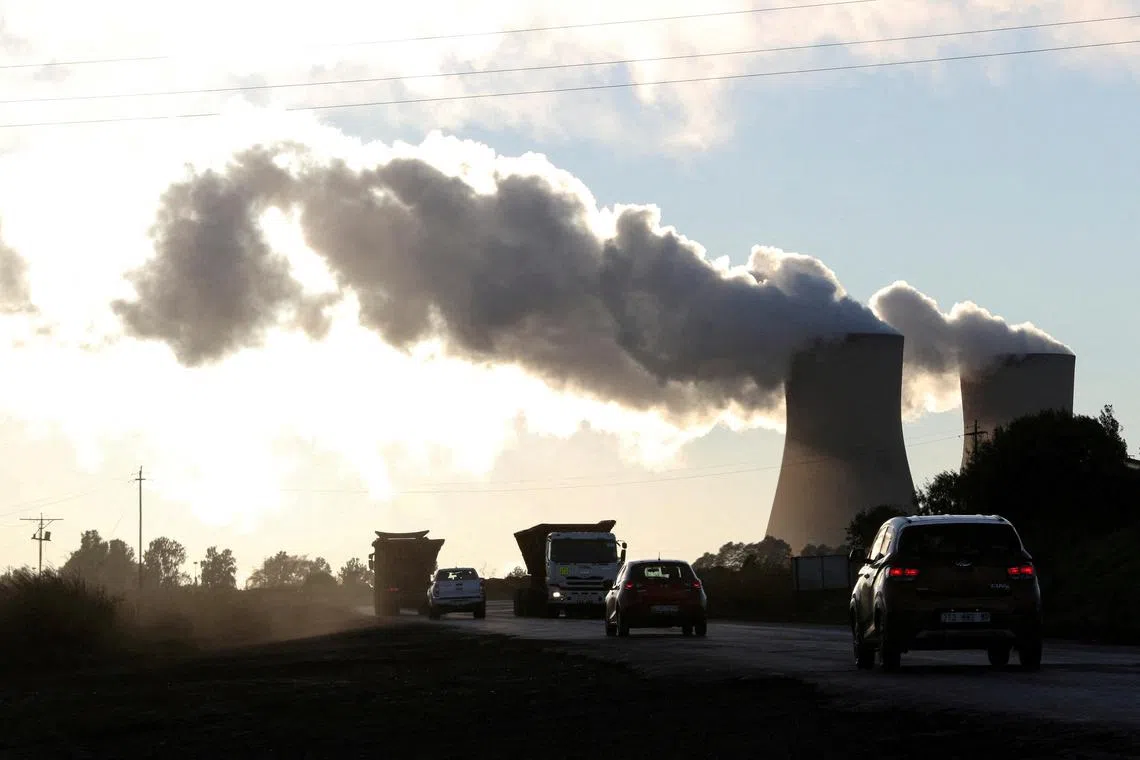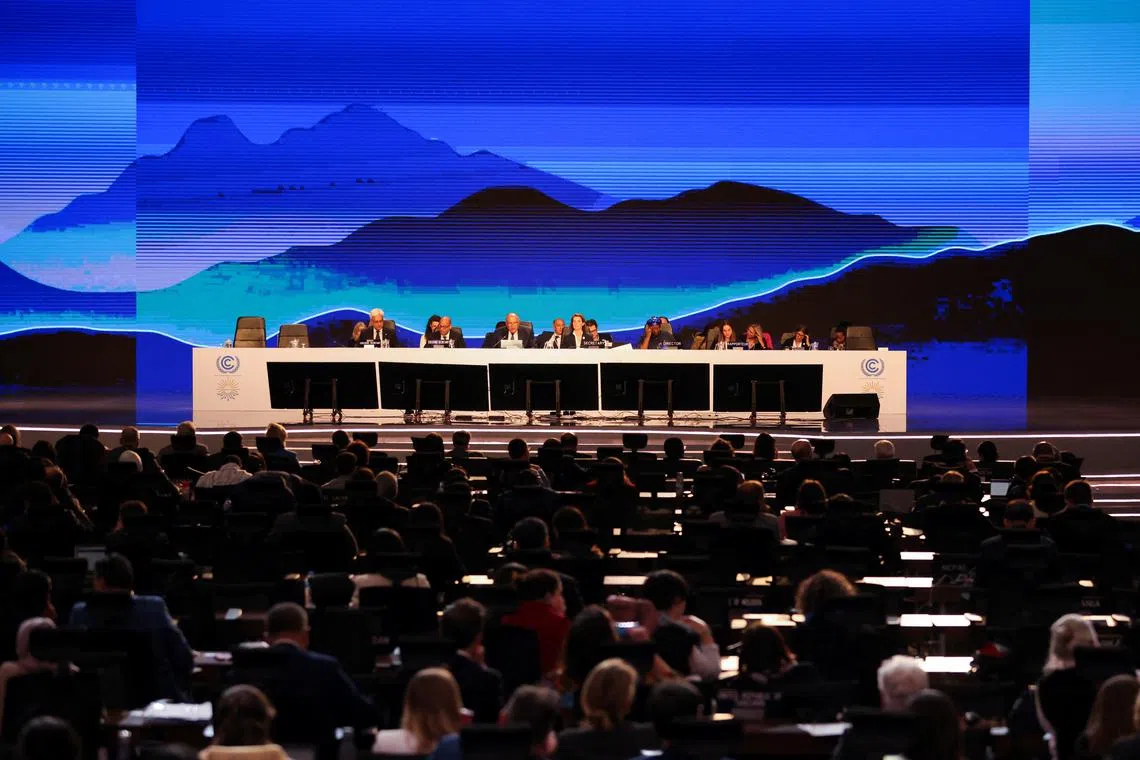COP27’s lost ambition endangers the world
Sign up now: Get ST's newsletters delivered to your inbox

COP27 failed to address the very thing driving climate change and loss and damage - fossil fuel emissions.
PHOTO: REUTERS
The United Nations climate talks that concluded on Sunday disappointed many. Despite overwhelming scientific evidence of the urgency for deep cuts in greenhouse gas emissions, the decisions adopted at the end of the two-week talks merely kicked the can down the road.
But on one key issue, the COP27 talks in Egypt
Defying the odds, the conference ended with an agreement to create a fund to help compensate poorer nations
Yet, in an ironic twist, COP27 failed to address the very thing driving climate change and loss and damage – fossil fuel emissions.
Global carbon dioxide (CO2) emissions are set to reach another peak this year, heating up the planet, fuelling yet more extreme weather and more destruction, with the poorest nations most impacted and less able to cope.
It is a vicious, self-perpetuating cycle caused mainly by the world’s largest and richest economies’ addiction to coal, oil and gas.
COP27 – the 27th meeting of the conference of the parties to the UN’s climate convention – ended with nearly 200 nations adopting the 13-page Sharm El-Sheikh Implementation Plan
There is barely a mention of fossil fuels, which might seem very odd to outside observers after this year’s headline-grabbing weather disasters.
The text calls for “accelerating efforts towards the phase-down of unabated coal power and phase-out of inefficient fossil fuel subsidies”. Unabated coal power here refers to coal plants that do not capture their CO2 emissions.
This is a cut-and-paste job from last year’s Glasgow Climate Pact, which was already controversial because the initial wording of “phasing out” of coal was changed to “phasing down” at the last minute.
Incredibly, until the Glasgow pact’s reference to coal, there had been no references to fossil fuels in the final decisions of nearly 30 years of UN climate meetings.
At COP27, a Saudi Arabian delegate reportedly told the conference: “We should not target sources of energy; we should focus on emissions. We should not mention fossil fuels.”
The European Union and many vulnerable developing nations pushed hard in Egypt to include a reference to phasing down all fossil fuels. There was also a call to strengthen the language around the urgency of keeping global average temperatures from breaching 1.5 deg C above pre-industrial levels, a key goal of the 2015 Paris Agreement.
In the end, the status quo language of Glasgow remained, meaning COP27 made no progress on ramping up global ambition to cut emissions. Questions remain on whether future COPs can muster the will to sharpen the language against fossil fuels.
The United Arab Emirates, a major oil and gas producer, is hosting next year’s COP28 talks. At the start of COP27, UAE’s President, Sheikh Mohammed bin Zayed al Nahyan, said the Gulf state will be a responsible supplier of oil and gas for as long as the world needs.
In Egypt, hundreds of fossil fuel executives also attended COP27, and they are likely to be welcome again next year.
Stark reality
All of this reflects the often surreal nature of UN climate diplomacy – its glacial pace and conflicting interests are seemingly detached from the rapid march of climate change.
The stark reality is that humanity has run out of time to tackle a man-made climate crisis.
The UN’s top climate science panel, the Intergovernmental Panel on Climate Change (IPCC), says the world risks far more extreme and deadly climate impacts beyond a 1.5 deg C warming, from worse storms and floods to longer droughts, more intense heatwaves and accelerating sea level rise as ice caps melt. The world has already warmed 1.2 deg C.

Ministers deliver statements during the closing plenary at the COP27 climate summit in Egypt on Nov 20, 2022.
PHOTO: REUTERS
In its latest assessment report, the IPCC said in April that limiting warming to around 1.5 deg C requires global greenhouse gas emissions to peak before 2025 at the latest, and be reduced 43 per cent by 2030 on 2019 levels.
That means no new fossil fuel projects, a conclusion also backed by the International Energy Agency.
The IPCC says all fossil fuels need to be drastically cut by 2050, especially coal, the dirtiest and most polluting fuel; which presents a challenge for nations with limited natural resources such as Singapore.
The Republic nonetheless has pledged to reach net-zero emissions by 2050 and has mapped out a pathway to achieve this using green electricity imports, low-carbon hydrogen, energy efficiency, electrification of transport, carbon capture and other technologies. These steps will help the nation progressively cut reliance on gas and oil as primary energy sources.
All nations need to dramatically overhaul their energy systems. Current climate plans are not enough.
Just before COP27, UN Climate Change’s assessment of national climate pledges found that the world is on track to warm around 2.5 deg C by the end of the century and that emissions will keep growing this decade.
In another study, the Global Carbon Project, an international consortium of science agencies, released its annual carbon budget during COP27 that estimated CO2 emissions would grow 1 per cent this year above 2021 levels and that based on current emissions, the 1.5 deg C threshold could be reached in nine years.
None of this is surprising.
For decades, scientists have been warning governments and the public of the risks of climate change and the need to shift away from fossil fuels. The main findings of the IPCC, ironically backed by the same governments that attend annual UN climate conferences, could not be clearer on the urgency for action and the risks from complacency.
Icarus and the sun
There are parallels here to the Greek tale of Icarus, son of the master craftsman Daedalus. The pair escaped imprisonment using wings Daedalus constructed using wax to hold together feathers and other materials.
But Icarus ignored his father’s warning not to fly too close to the sun. His wings melted and he drowned.
Humanity is on the same foolish path.
Yet, there is some good news. The loss and damage fund will help restore some of the deep mistrust between rich and poor nations, caused in large part by wealthy nations failing to fully deliver on a long-promised US$100 billion (S$137 billion) in annual climate finance.
The decision at COP27 means talks will now start on the design, management and sources of financing for the fund, with the aim of broadening the sources of money to richer developing nations such as China and South Korea, and possibly Qatar, Singapore and others.
There is also a concerted push to reform the multilateral development banks, especially the World Bank, to provide more climate finance.
During COP27, Indonesia’s efforts to phase out its coal power plants got a boost with two related programmes announcing progress.
The Just Energy Transition Partnership (JETP), backed by a global group of nations including the United States and Japan, said it would provide Indonesia with US$20 billion in public and private finance to ramp up renewable energy investment and help workers in the polluting coal sector to transition to clean-energy jobs.
A separate Asian Development Bank (ADB) programme, the Energy Transition Mechanism, also announced its first deal for the early retirement of an Indonesian coal power plant.
The ADB model, if successful, could be rolled out across the region and could also be the model used in JETP deals in Asia and elsewhere.
In other deals, Egypt and Norway unveiled plans to establish a 100-megawatt green hydrogen plant on the Red Sea, while on Monday, a major investor said construction on one of the world’s largest wind farms
COP27 also brought together governments and businesses to discuss deals to boost carbon trading, protect forests and oceans that are key natural CO2 sinks, as well as inspire closer collaborations on research and technology.
COP out?
But even as green investment is growing, new fossil fuel deals are still being done and these risk locking in new CO2 emissions for possibly decades to come, effectively making the goal to limit warming to 1.5 deg C impossible to achieve.
And, if more reminders are needed of the future that awaits humanity, look at Australia, the world’s No. 3 fossil fuel exporter.
The government’s latest State of the Climate report released on Wednesday said Australia’s climate has warmed by an average of 1.47 deg C since national records began in 1910. The country faces a future of greater weather-related extremes, from more intense rainfall events and warming oceans to longer fire seasons and higher sea levels that will increase coastal erosion.
It means the country will have to adapt to a very different future.
While the UN climate talks process is key to bringing together nations to try to accelerate action, COP27 showed yet again that the pace of these negotiations fails to match the gravity of the situation.
It seems unlikely that COP28 host UAE will accept tougher language to phase out all fossil fuels, despite its efforts to burnish its green credentials. And at COP28, a UN-mandated stock take of global efforts to tackle climate change will surely highlight the failings of most governments.
Which makes the story of Icarus all the more vital. Humanity still has a chance to avoid flying too close to the sun. But only a very slim chance.



